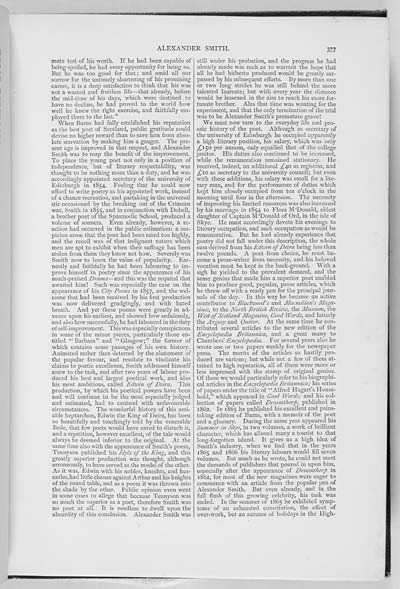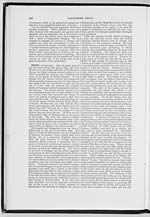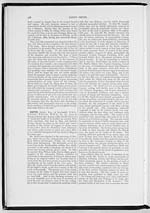Volume 3 > Half-Volume 6
(23) Page 377
Download files
Individual page:
Thumbnail gallery: Grid view | List view

377 mate test of his worth. If he had been capable of being spoiled, he had every opportunity for being so. But he was too good for that; and amid all our sorrow for the untimely shortening of his promising career, it is a deep satisfaction to think that his was not a wasted and fruitless life�that already, before the mid-time of his days, which were destined to have no decline, he had proved to the world how well he knew the right exercise, and faithfully em- ployed them to the last." When Burns had fully established his reputation as the best poet of Scotland, public gratitude could devise no higher reward than to save him from abso- lute starvation by making him a gauger. The pre- sent age is improved in that respect, and Alexander Smith was to reap the benefit of the improvement. To place the young poet not only in a position of independence, but of literary respectability, was thought to be nothing more than a duty, and he was accordingly appointed secretary of the university of Edinburgh in 1854. Feeling that he could now afford to write poetry as his appointed work, instead of a chance recreation, and partaking in the universal stir occasioned by the breaking out of the Crimean war, Smith in 1855, and in conjunction with Dobell, a brother poet of the Spasmodic School, produced a volume of sonnets. Even already, however, a re- action had occurred in the public estimation: a sus- picion arose that the poet had been rated too highly, and the recoil was of that indignant nature which men are apt to exhibit when their suffrage has been stolen from them they know not how. Severely was Smith now to learn the value of popularity. Ear- nestly and faithfully he had been labouring to im- prove himself in poetry since the appearance of his much-praised Drama�and this was the requital that awaited him! Such was especially the case on the appearance of his City Poems in 1857, and the wel- come that had been received by his first production was now delivered grudgingly, and with bated breath. And yet these poems were greatly in ad- vance upon his earliest, and showed how sedulously, and also how successfully, he had laboured in the duty of self-improvement. This was especially conspicuous in some of the minor pieces, particularly those en- titled "Barbara" and "Glasgow;" the former of which contains some passages of his own history. Animated rather than deterred by the abatement of the popular favour, and resolute to vindicate his claims to poetic excellence, Smith addressed himself anew to the task, and after two years of labour pro- duced his best and largest poetical work, and also his most ambitious, called Edwin of Deira. This production, by which his poetical powers have been and will continue to be the most especially judged and estimated, had to contend with unfavourable circumstances. The wonderful history of this ami- able heptarchon, Edwin the King of Deira, has been so beautifully and touchingly told by the venerable Bede, that few poets would have cared to disturb it, and a repetition, however excellent, of the tale would always be deemed inferior to the original. At the same time also with the appearance of Smith's poem, Tennyson published his Idyls of the King, and this greatly superior production was thought, although erroneously, to have served as the model of the other. As it was, Edwin with his nobles, knechts, and hus- carles,had little chance against Arthur and his knights of the round table, and as a poem it was thrown into the shade by the other. Public opinion even went in some cases to allege that because Tennyson was so much the superior as a poet, therefore Smith was no poet at all. It is needless to dwell upon the absurdity of this conclusion. Alexander Smith was still under his probation, and the progress he had already made was such as to warrant the hope that all he had hitherto produced would be greatly sur- passed by his subsequent efforts. By more than one or two long strides he was still behind the more talented laureate; but with every year the distance would be lessened in the aim to reach his more for- tunate brother. Alas that time was wanting for the experiment, and that the only termination of the trial was to be Alexander Smith's premature grave! We must now turn to the everyday life and pro- saic history of the poet. Although as secretary of the university of Edinburgh he occupied apparently a high literary position, his salary, which was only �150 per annum, only equalled that of the college janitor. His duties also continued to be increased, while the remuneration remained stationary. He received, indeed, an additional �40 as registrar, and �10 as secretary to the university council; but even with these additions, his salary was small for a lite- rary man, and for the performance of duties which kept him closely occupied from ten o'clock in the morning until four in the afternoon. The necessity of improving his limited resources was also increased by his marriage in 1854 to Flora M'Donald, eldest daughter of Captain M 'Donald of Ord, in the isle of Skye. He must accordingly devote his evenings to literary occupation, and such occupation as would be remunerative. But he had already experience that poetry did not fall under this description, the whole sum derived from his Edwin of Deira being less than twelve pounds. A poet from choice, he must be- come a prose-writer from necessity, and his beloved vocation must be kept in the back-ground. With a sigh he yielded to the prevalent demand, and the same genius that made him a superior poet enabled him to produce good, popular, prose articles, which he threw off with a ready pen for the principal jour- nals of the day. In this way he became an active contributor to Blackwood's and Macmillan's Maga- zines, to the North British Review, the Museum, the West of Scotland Magazine, Good Words, and latterly the Argosy and Quiver. At the same time he con- tributed several articles to the new edition of the Encyclop�dia Britannica, and a great many to Chambers' Encyclop�dia. For several years also he wrote one or two papers weekly for the newspaper press. The merits of the articles so hastily pro- duced are various; but while not a few of them at- tained to high reputation, all of them were more or less impressed with the stamp of original genius. Of these we would particularly refer to his biographi- cal articles in the Encyclop�dia Britannica; his series of papers under the title of "Alfred Hagart's House- hold," which appeared in Good Words; and his col- lection of papers called Dreamthorp, published in 1862. In 1865 he published his excellent and pains- taking edition of Burns, with a memoir of the poet and a glossary. During the same year appeared his Summer in Skye, in two volumes, a work of brilliant character, which has allured many a tourist to that long-forgotten island. It gives us a high idea of Smith's industry, when we find that in the years 1865 and 1866 his literary labours would fill seven volumes. But much as he wrote, he could not meet the demands of publishers that poured in upon him, especially after the appearance of Dreamthorp in 1862, for most of the new magazines were eager to commence with an article from the popular pen of Alexander Smith. But even already, and in the full flush of this growing celebrity, his task was ended. In the summer of 1865 he exhibited symp- toms of an exhausted constitution, the effect of over-work, but an autumn of holidays in the High-
Set display mode to:
![]() Universal Viewer |
Universal Viewer | ![]() Mirador |
Large image | Transcription
Mirador |
Large image | Transcription
Images and transcriptions on this page, including medium image downloads, may be used under the Creative Commons Attribution 4.0 International Licence unless otherwise stated. ![]()
| Biographical dictionary of eminent Scotsmen > Volume 3 > Half-Volume 6 > (23) Page 377 |
|---|
| Permanent URL | https://digital.nls.uk/74514320 |
|---|---|
| Attribution and copyright: |
|
| Description | Volume III. Contains names alphabetically from Macadam to Young. |
|---|

